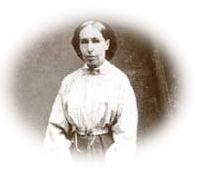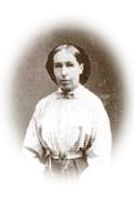Newport, R. I., July 25.
Dear Friend, — I have slept in my own bed! or, rather, I did not sleep, — I lay awake thinking of a poor Southern fellow who said to me one morning: “I could n’t sleep, ma’am, for thinking how comfortable I was!”
We left Harrison’s Landing on Thursday in the “Daniel Webster,” with two hundred and thirty sick on board. At Fortress Monroe Mrs. Griffin came off from the “Euterpe”[1] to ask me to take her cousin, a captain in the regular army, to his friends in Newport. We had some difficulty in getting him on board, for the sea was running very high at midnight, when Mr. Olmsted put the “Webster” as close to the “Euterpe ” as he dared. The captain had typhoid fever, with a good deal of low delirium; but he did very well during the voyage, having a comfortable berth on deck under cover. When we reached New York I took him over to the Newport boat in an ambulance, hunted up Captain Brown, and made him establish my patient on his stretcher in the airiest part of the boat. It was rich to see the state of fuss into which that worthy man was thrown, and to hear him exhort me to “keep calm”! As soon as I could, I went below, and made the stewardess give me oceans of warm water, out of which I emerged a new creature. When I went back to my captain I found a lady sitting by him,—his mother, who happened to be going to Newport on that boat! So I gave up my last patient into better hands, — though at night, when I found him moved out of the fresh air, so essential to him, into the close cabin, I wished I had held command over him till we landed, and sighed over the follies of private nursing.
I met several friends on board. Mr. Tweedy gave me his stateroom, and Mr. Edward King took me down to supper, — an excursion I never made in my civilized existence; but now (think of it!) the lights, the flowers, the feast, seemed to me delicious and magnificent,— an Arabian Nights’ entertainment! No one will accuse us of having “eaten up the gifts of the people” on board the “Small.” If they do, I shall make Dr. Bigelow give us a testimonial about it. He owes it to us in return for all the grumbling which he did over our bad food. The last I saw of him was at the best restaurant in Washington, where we left him on the 5th of July; but he tells me in a subsequent letter that he went to see Dr. Bellows, President of the Sanitary Commission, and that, owing to his strong representations of the horrors on board the “Wilson Small,” “a cook, a cooking-stove, and something to eat” were to be sent down at once. “I told him,” he adds, “that in all probability no one on board that boat woold live to get home; but that a few puddings, if administered immediately, might save one or two: and I gave him six excellent recipes.” Can’t you imagine them?
The Hospital Transport Service is ended. We left the “Elizabeth” well supplied, and moored to the long wharf at Harrison’s Landing, where the surgeons and chaplains and quartermasters can get at her with ease. Dr. Jenkins and Dr. Douglas remain to superintend the issue of stores and inspect the condition of camps and regiments; but the transports are given back to the Quartermaster’s Department: our reign is over. I wonder who’ll succeed to my cabin on the “Small,” and hang his clothes on my gimlets (used for pegs), and inherit my other little inventions of that nature?
Georgy and Mr. Olmsted and I sat up the greater part of our last night on the “Webster,” talking as people will who know that on the morrow they are to separate widely. Did I say somewhere that Mr. Olmsted was severe, or something of that kind? Well, I am glad I said it, that I may now unsay it. Nothing could be more untrue; every day I have understood and valued and trusted him more and more. This expedition, if it has done no other good, has made a body of life-long friends. We have a period to look back upon when we worked together under the deepest feelings, and to the extent of our powers, shoulder to shoulder, helping each other to the best of our ability, no one failing or hindering another. From first to last there has been perfect accord among us; and I can never look back to these months without feeling that God has been very good to let me share in them and see human nature under such aspects. It is sad to feel that it is all over.
The first thing Mr. Olmsted did on arriving in New York was to send down a cargo of vegetables to check the scurvy, that enemy having appeared in force. Mother was greatly amused by my reply to her inquiry: “What shall be done with that last hundred dollars?” “Oh, spend it in onions!” I cried, enthusiastically. The last I saw of Mr. Olmsted he was disappearing down the side of the “Webster,” clad in the garb of a fashionable gentleman. I rubbed my eyes, and felt then that it was indeed all over. I myself had risen to the occasion by putting on a black-lace tablespoon [such were the bonnets of the period], in which I became at once conventional and duly civilized.
We are not yet forgotten on the James; at least I am assured of it in two letters, — one from the Great Mogul, the Medical Inspector General; the other from that United States Officer who did more than any other to make our work successful. They are characteristic. One writes: “How I miss the dear ladies of the ‘Wilson Small’ and their freshening drinks, — animal that I am! but how can I forget that which comforted me?” The other says: “The departure of the ‘Wilson Small’ has left a sad blank in these waters. It always had a humanizing effect upon me to go on board, if only for a moment. I trust that when this weary war is over I may meet the friends I have made here under happier skies.”
There! my story is done. A short three months ago I wrote to tell you it was beginning; but what a lifetime lies between now and then!
[1] Sister-ship to the “St. Mark.” She was used as a receiving hospital in Hampton Roads. Mrs. Griffin took charge of the women’s department on her for several weeks.





